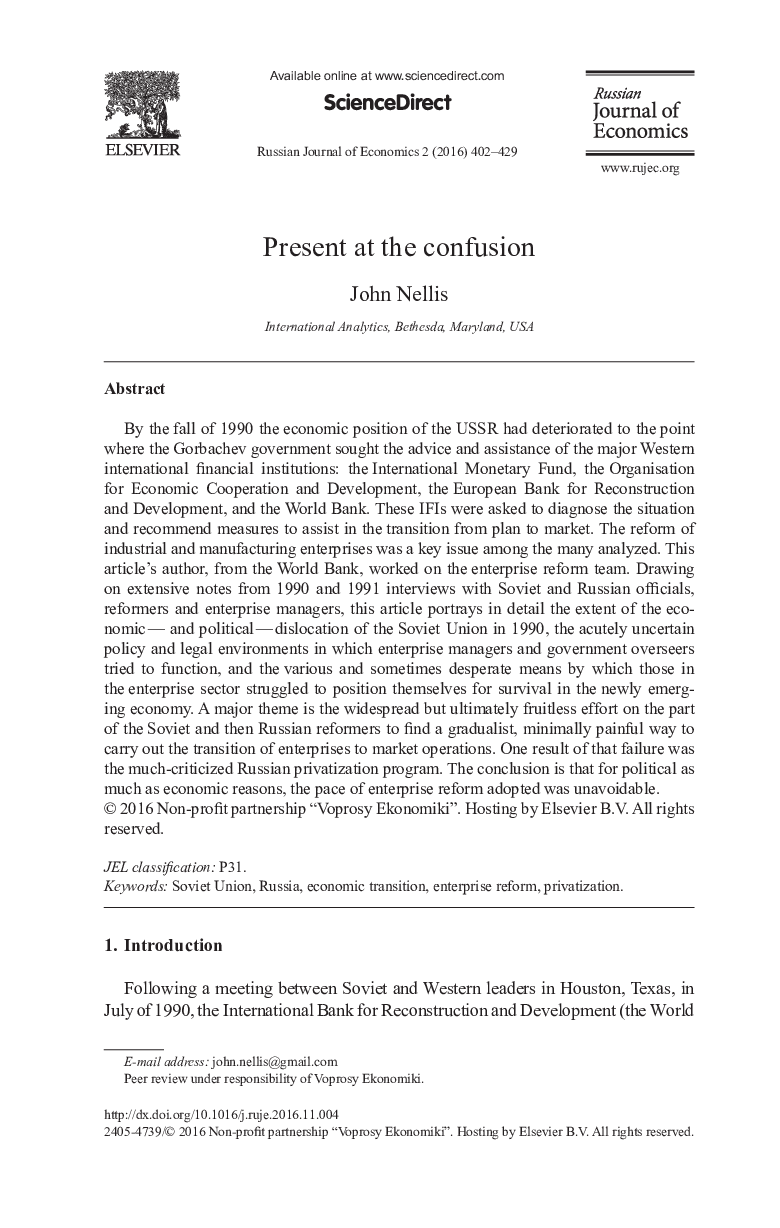| کد مقاله | کد نشریه | سال انتشار | مقاله انگلیسی | نسخه تمام متن |
|---|---|---|---|---|
| 7388622 | 1480987 | 2016 | 28 صفحه PDF | دانلود رایگان |
عنوان انگلیسی مقاله ISI
Present at the confusion
ترجمه فارسی عنوان
در حال سردرگمی است
دانلود مقاله + سفارش ترجمه
دانلود مقاله ISI انگلیسی
رایگان برای ایرانیان
کلمات کلیدی
ترجمه چکیده
در پاییز سال 1990، موقعیت اقتصادی اتحاد جماهیر شوروی تا جایی که دولت گورباچف به دنبال مشاوره و کمک از موسسات مالی بین المللی عمده غرب بود، رو به وخامت گذاشت: صندوق بین المللی پول، سازمان همکاری های اقتصادی و توسعه، بانک اروپایی برای بازسازی و توسعه و بانک جهانی. از این موسسات مالی و اداری خواسته شد که وضعیت را تشخیص دهند و اقداماتی را برای کمک به انتقال از طرح به بازار پیشنهاد کنند. اصلاحات صنایع صنعتی و صنعتی موضوع اصلی در میان بسیاری از تحلیل هاست. نویسنده این مقاله، از بانک جهانی، در تیم اصلاحات سازمانی مشغول به کار است. با توجه به یادداشت های گسترده ای از مصاحبه های سال های 1990 و 1991 با مقامات شوروی و روسیه، اصلاح طلبان و مدیران شرکت ها، این مقاله به طور کامل تصویری از میزان جابجایی اقتصادی و سیاسی اتحاد جماهیر شوروی در سال 1990 را نشان می دهد، سیاست های نامطمئن و محیط قانونی در مدیران شرکت ها و ناظران دولتی سعی داشتند کار کنند و ابزارهای گوناگونی و گاه ناامیدکننده که توسط آن افراد در بخش سازمانی تلاش می کردند خود را برای بقا در اقتصاد نوظهور در نظر بگیرند. موضوع مهم این است که تلاش گسترده، اما در نهایت بی ثمر بخشی از اصلاح طلبان شوروی و سپس روسیه برای پیدا کردن یک گام به گام و به حداقل رساندن دردناک برای انجام انتقال از شرکت ها به عملیات بازار است. یک نتیجه از این شکست، برنامه انتقاد خصوصی روسیه بود. نتیجه گیری این است که از نظر اقتصادی به دلایل اقتصادی، سرعت اصلاحات اصلاحی سازمانی، اجتناب ناپذیر است.
موضوعات مرتبط
علوم انسانی و اجتماعی
اقتصاد، اقتصادسنجی و امور مالی
اقتصاد و اقتصادسنجی
چکیده انگلیسی
By the fall of 1990 the economic position of the USSR had deteriorated to the point where the Gorbachev government sought the advice and assistance of the major Western international financial institutions: the International Monetary Fund, the Organisation for Economic Cooperation and Development, the European Bank for Reconstruction and Development, and the World Bank. These IFIs were asked to diagnose the situation and recommend measures to assist in the transition from plan to market. The reform of industrial and manufacturing enterprises was a key issue among the many analyzed. This article's author, from the World Bank, worked on the enterprise reform team. Drawing on extensive notes from 1990 and 1991 interviews with Soviet and Russian officials, reformers and enterprise managers, this article portrays in detail the extent of the economic - and political - dislocation of the Soviet Union in 1990, the acutely uncertain policy and legal environments in which enterprise managers and government overseers tried to function, and the various and sometimes desperate means by which those in the enterprise sector struggled to position themselves for survival in the newly emerging economy. A major theme is the widespread but ultimately fruitless effort on the part of the Soviet and then Russian reformers to find a gradualist, minimally painful way to carry out the transition of enterprises to market operations. One result of that failure was the much-criticized Russian privatization program. The conclusion is that for political as much as economic reasons, the pace of enterprise reform adopted was unavoidable.
ناشر
Database: Elsevier - ScienceDirect (ساینس دایرکت)
Journal: Russian Journal of Economics - Volume 2, Issue 4, December 2016, Pages 402-429
Journal: Russian Journal of Economics - Volume 2, Issue 4, December 2016, Pages 402-429
نویسندگان
John Nellis,
